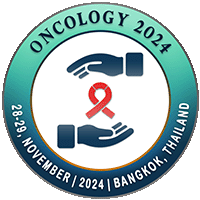
Ruslan Starostin
Republican Clinical Oncological Dispensary of the Tatarstan Republic, Russian FederationTitle: Colorectal cancer screening in the Republic of Tatarstan
Abstract
Introduction. The incidence of colorectal cancer increases all over the world, the Republic of Tatarstan (Russia) is not an exception. Colorectal cancer was ranked the first in terms of the number of newly diagnosed cases in our republic in 2021. Taking into account the increase in incidence, early diagnosis of malignant neoplasms of this localization is necessary. Therefore, screening must be applied. The most widely used screening test is the fecal occult blood test. Aim. To evaluate the informativeness of a complex of markers for colorectal cancer screening. Materials and methods. Before screening, we decided to identify the most informative markers in 63 patients with histologically confirmed colorectal cancer prior to treatment. We used occult blood test Hexagon OBTI, TIMP-1, MMP-9 ? fTu M2-PK as markers. The control group was presented by 20 healthy individuals. 1071 persons all aged over 45 years underwent colorectal cancer screening. The exclusion criteria – bleeding at the time of the study. At the screening stage, we used the two most informative markers. FTu M2-PK was estimated using immunoassay testing systems ScheBo Tu M2-PKTM ELISA Stool Test (ScheBo Biotech AG, Germany), quick fecal occult blood test analysis – Hexagon OBTI (HUMAN, Germany), ???-9 and TIMP-1 levels were estimated using Quantikine ELISA (R&D Systems, USA) with our modification. The essence of our modification is to incubate coprofiltrate samples at +4C temperature instead of indoor temperature, because faeces contain a large number of microbial proteinases capable of degrading proteins including MMP and TIMP-1. Results. TIMP-1 and MMP-9 levels in coprofiltrates of colorectal cancer patients were significantly higher compare to those in the control group, and did not depend on the stage of the disease and tumor localization. The level of fTu M2-PK in coprofiltrates of colorectal cancer patients did not differ from the level of this marker of the control group. The test turned out to be uninformative. TIMP-1 and Hexagon OBTI turned out to be the most informative tests for colorectal cancer diagnosis with sensitivity of 76,2% and 86,2%, specificity of 95% and 93,8% and accuracy of 80,7% and 87,7% respectively. Taking into account high informativeness of TIMP-1 and Hexagon OBTI in colorectal cancer diagnostic, these markers were applied in colorectal cancer screening. Due to the high cost of TIMP-1 this marker was applied only in those (73 persons) with positive Hexagon OBTI test. The informativeness of TIMP-1 in colorectal cancer screening: sensitivity – 100%, specificity 70,8% and accuracy 76%. The informativeness of Hexagon OBTI in colorectal cancer screening: sensitivity – 75%, specificity 97,9% and accuracy 97,9%. The use of the combination of TIMP-1 and Hexagon OBTI tests for colorectal cancer screening increased their informativeness: sensitivity increased to 100%, specificity to 97,3%, accuracy to 97,3%. Conclusion. Using two markers (TIMP-1 and Hexagon OBTI) in colorectal cancer screening increases its effectiveness.
Biography
He graduated from the Kazan State Medical University and have finished residency in the field of oncology in the Kazan State Medical Academy. Currently working in one of the leading oncological institutions of the Russian Federation (Republican Clinical Oncological Dispensary of the Tatarstan Republic, Russia) and is a resident doctor of the department of reconstructive and plastic surgery of the Kazan State Federal University. He have publications in the fields of colorectal cancer and breast cancer.

